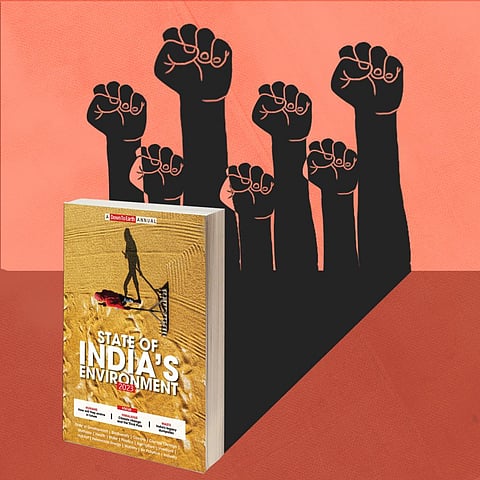An idea that lasted
The first State of India’s Environment had chance beginnings. It was sometime in 1980, when our colleague Anil Agarwal, then a journalist returning to India after a stint with the International Institute for Environment and Development in London, went to a conference in Malaysia.
As he recounts in the introduction to the 1982 report, he came across a publication by Consumer Action Group—an organisation based in Penang, Malaysia, which tracked events in that country. He then decided that it was important to have an annual report card on the state of environment in India.
This was 1981, a time when environment was not a matter of concern, let alone news. So, Anil, with a small group, stitched together the year's developments by painstakingly putting together snapshots from media reports, research articles and news, along with perspectives from the ground.
This report told us that India needed to take care of the environment, even when it was poor, because natural resources were the subsistence base of its people.
It told us that environment and development were two sides of the same coin, and that environmental management was not about technocratic decisions, but about the politics of self-determination and community ownership of resources. This unique perspective has defined the country’s environmental movement.
The tradition of an annual report card on the environment has been continued by my colleagues at the Centre for Science and Environment and Down To Earth, with the latest edition of the State of India's Environment 2023 (SOE 2023) released recently.
The big take on the four decades is that there is news to cheer—environment has now become mainstreamed; we are all outraged at how pollution is affecting our health; how climate change is impacting the poor; how deforestation will lead to more poverty and desertification. This is also leading to change; things are getting better in some cases.
But the bad news is that we are not acting at a scale commensurate with the devastation that we see around us. Unless we take deliberate steps to reverse the damage, we are losing the battle. This tells us what needs to be done.
The really bad news, of course, is that climate change impacts are now visible and are devastating lives, particularly of the poorest who, in many cases, have no option but to migrate to cope with the relentless attacks on crops and livelihoods.
SOE 2023 tells us that displacement because of extreme weather events has now outpaced migration because of war and conflict. It tells us of the many trends that should concern us—from the rising fodder shortages that will impinge on people's economies to the question of extinction, as the world loses more and more species to the so-called development race.
But there is also something to celebrate. First, the fact is that cities are learning the art of becoming waste-wise; learning to segregate at source; to minimise plastics and to reuse and reprocess waste into wealth.
We are even taking household waste to manufacture fuel, which then runs buses in cities. More and more cities are moving towards off-site non-sewered solutions for excreta management, taking sewage from households to treatment plants that can then recycle and reuse waste.
There is evidence that traditional and regenerative farming methods work. These systems are good for soil, water, productivity and farmers. Now we need to ensure that farmers benefit from them, so that good food is not a luxury of the rich, but affordable to all.
Then there is a greater demand for community forest rights across the country; women are showing how they can manage forests for livelihoods, so that the country can build a wood-based economy.
The important point to realise is that change is visible. The very method of managing the environment has been re-engineered, so that there is an alternative pathway to growth or to minimise the adverse impact of growth.
It is also a lesson to remember, as the country reviews strategies for new energy systems, like renewables or introduction of electric vehicles (e-vehicles). The fact is that in both the cases, the progress is sputtering and not accelerating because we are doing nothing with the deliberateness that the issues require.
For instance, e-vehicles still constitute a mere three per cent of the new vehicles registered in India. And though solar and wind installations are growing, energy poverty is still real and hurtful. Energy transformation will need to be just and equitable to be affordable to the poorest.
The bottom line is that environmentalism will need to keep pushing the envelope of change, even harder. It will need to track and report, so that the truth is not hidden and at the same time, has the courage to stand behind solutions. Environmentalism is about deepening of democracy not a techno-fix.


